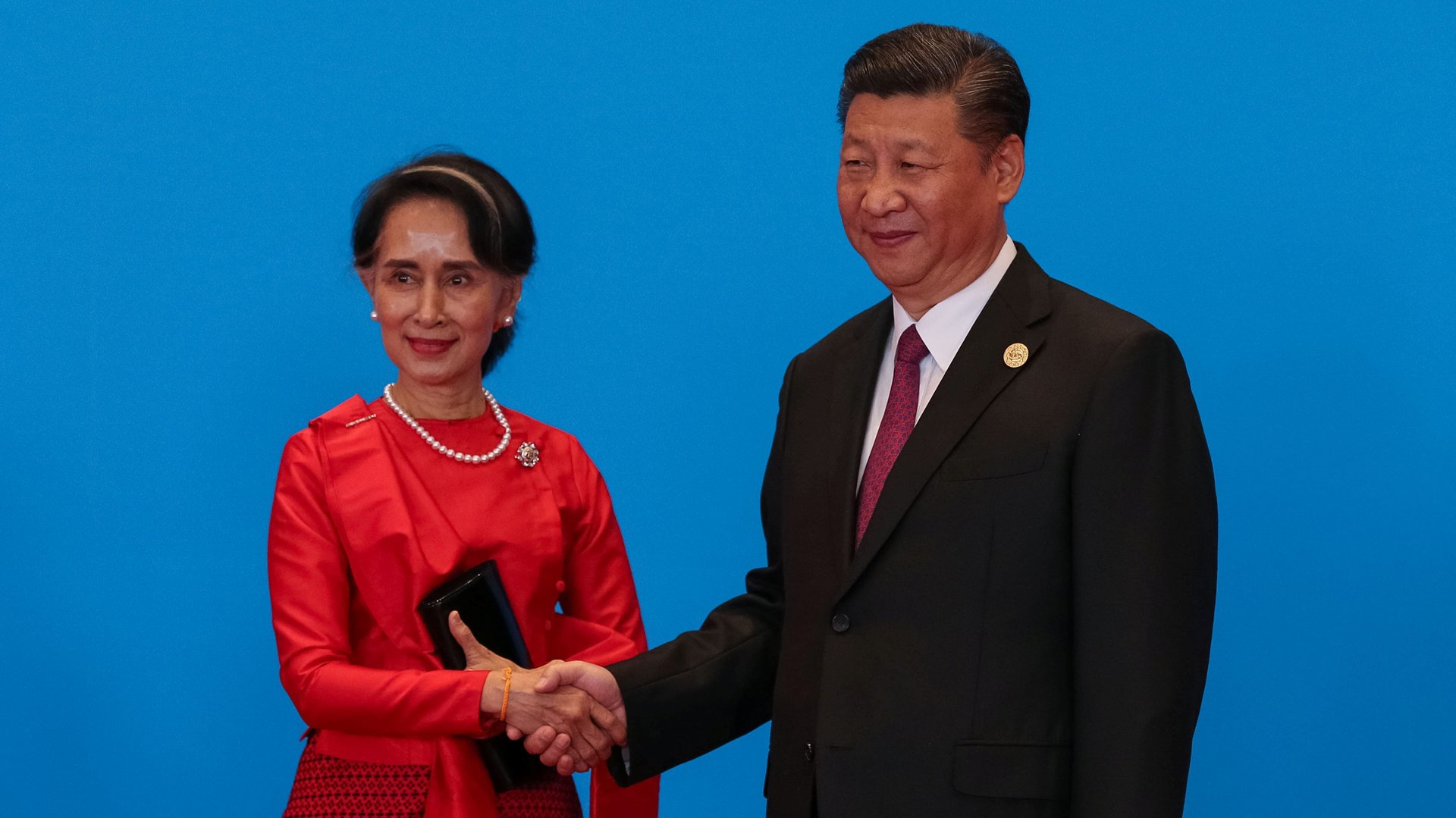China’s new global leadership role doesn’t involve dealing with the humanitarian crisis on its doorstep
China’s Xi Jinping has positioned himself as a leader the world desperately needs, having vowed to set an example on issues from free trade to climate change. It’s not surprising that he took the opportunity at this week’s annual summit of the BRICS nations to emphasize that point of view.


China’s Xi Jinping has positioned himself as a leader the world desperately needs, having vowed to set an example on issues from free trade to climate change. It’s not surprising that he took the opportunity at this week’s annual summit of the BRICS nations to emphasize that point of view.
“We BRICS countries share the agony of those people who are still caught in chaos and poverty,” Xi said in his big speech at the meeting, calling on the five-member bloc, which includes Russia and India, to develop themselves “with the well-being of the world in our mind.” On the last day of the event, Xi also pledged to offer $500 million in aid for a broad framework that aims to facilitate social and economic exchanges among developing countries.
But Xi’s messages have been compromised by China’s mostly muted response to an ongoing humanitarian crisis very nearby, arguably a critical opportunity to help people caught in chaos.
Around 150,000 refugees have fled into Bangladesh in recent days after violence engulfed their homes in neighboring Myanmar, according to the United Nations. The Rohingya, a stateless minority Muslim group who mostly live in the Rakhine state in western Myanmar, have faced years of mistreatment and percecution. The latest conflict was triggered on Aug. 25 when Rohingya militants attacked local police posts. Myanmar’s military said around 400 people—most of them Rohingya—have been killed in the violence. Conflicting accounts of the Rohingya fleeing Myanmar and the government have been reported. Myanmar’s de facto leader Aung San Suu Kyi has blamed fake news for benefiting “terrorists” in the crisis.
China, for its part, said in a statement Aug. 31 that it condemns the violent attacks occurred in Rakhine, and “as a friendly neighbor,” it supports Myanmar’s efforts to maintain peace in the region.
Earlier this year China offered to mediate the diplomatic row between Myanmar and Bangladesh over a previous flight of Rohingya, as both nations see the Muslim minority as the other side’s problem. In May Xi also assured Suu Kyi that China would continue to help with Myanmar’s peace process.
But rhetoric aside, China seems to have no strategy in place for a large-scale crisis. For one thing, the communist state is reluctant to take refugees—it typically only hosts them temporarily while waiting for them to be transferred to another country. In March, when a new round of ethnic conflict broke out in Myanmar’s northeastern Kokang region, close to the Chinese province of Yunnan, thousands of refugees—most of them ethnic Chinese—did find their way to a relief camp in the neighboring Chinese small town of Nansan. In the case of Rakhine state, on the other side of Myanmar, China is far out of reach.
China could offer aid to Bangladesh directed to helping with the costs of dealing with the latest wave of refugees. But that would risk flying in the face of its official stance of not interfering with other countries’ domestic affairs. The same applies to, for instance, issuing a strongly-worded statement to put pressure on Myanmar to stem its military operations.
Also at play are China’s economic ties with Myanmar, regarded as part of Xi’s “One Belt, One Road (OBOR)” initiative, a trillion-dollar infrastructure plan that reaches across Asia and to Europe. China’s direct investment in Myanmar dwarfs all other countries over the long-term with nearly $19 billion put into mostly transportation, communications and manufacturing sectors from 1988 to 2017, including nearly $3 billion in the most recent financial year. With that in mind, China would want Myanmar to maintain peace for the good of the Chinese projects there, particular those infrastructure investments that run through Rakhine. But meanwhile it wouldn’t want to jeopardize investment opportunities by going against Myanmar’s government on this issue.
As Ashraful Azad, an assistant professor of International Relations at Bangladesh’s University of Chittagong, noted in a column in The Conversation, for its powerful neighbors such as China and India, “Myanmar is an untapped resource and investment hub waiting to be explored. It has become evident that the humanitarian intervention is reserved for strategic and business usefulness, not to protect the most vulnerable.”
For now, particularly as China grapples with the growing threat posed by a belligerent North Korea, it’s not likely to face excess scrutiny by other powers over its stance with Myanmar. And other neighbors such as India, whose prime minister while in Myanmar this week signed on to a statement condemning the militant attacks in Rakhine, but did not mention the Rohingya fleeing their homes, aren’t setting a shining example.
But as China speaks out more forcefully on a range of global concerns, its ability to also take a strong leadership role when it comes to a humanitarian crisis in Asia is going to place a question mark over Xi’s global vision.